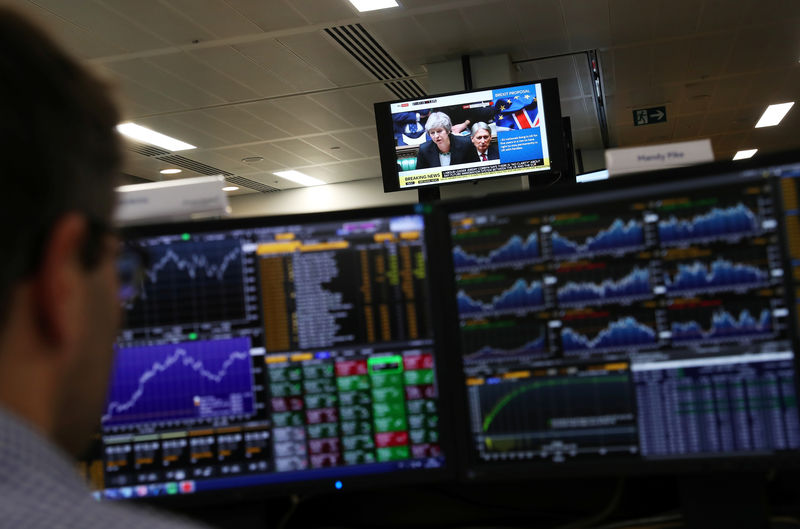By Helen Reid and Danilo Masoni
LONDON/MILAN (Reuters) - British shares suffered and sterling tumbled on Thursday as the growing risk of a disorderly divorce from the European Union spooked investors, with leading index the FTSE 100 moving for most of the day in rare lockstep with the domestic currency.
The FTSE 100 (FTSE) eventually ended broadly flat, reversing the session's earlier 0.8 percent fall, which came even as sterling dived after high-profile resignations thrust Prime Minister Theresa May's government into turmoil, just a day after she clinched a draft Brexit deal.
The FTSE 100, which makes 70 percent of its income overseas, is normally boosted by a weaker pound, but losses in companies more exposed to the domestic economy, such as banks and housebuilders, almost offset gains in the big exporters. It ended up just 0.06 percent.
The more domestically-exposed FTSE 250 (FTMC) fell 1.3 percent, while the neighbouring Irish bourse (ISEQ) fell 3.9 percent, its worst daily performance since the Brexit referendum more than two years ago.
"It feels a bit like 24 June 2016, to a smaller degree, as anything that's a pure play on the UK economy is getting smashed today," said David Keir, co-manager of the TB Saracen Global Income and Growth Fund in Edinburgh, referring to the day after Britain's vote on leaving the EU.
"People are fearful that this will lead to a hard Brexit and a general election which at the moment would lead to a Jeremy Corbyn (Labour) government, which would not be good for sterling or UK stocks," he added.
According to a Reuters analysis of data, the FTSE 100 and sterling have moved in tandem so far this week, the first time since Sept. 29, underscoring deepening worries about the fall-out across Britain's financial markets and economy from the tumultuous negotiations for a Brexit deal.
The resignations of Brexit minister Dominic Raab and work and pensions minister Esther McVey in protest at May's draft deal for leaving the European Union pushed sterling
Traders said uncertainty had increased, with possible scenarios now including a second referendum, a general election or a hard Brexit.
"There is a high risk that parliament fails to pass the withdrawal deal in December," said David Page, senior economist for the UK and U.S. at AXA Investment Managers.
"Uncertainty over the coming months is going to be high and the prospect of a disorderly exit in March is rising," he added.
Shares in state-owned lender Royal Bank of Scotland (L:RBS) sank 9.3 percent, suffering their worst one-day loss since the June 2016 post-Brexit vote selloff, as shareholders priced in a higher risk of a general election.
The Labour party has pledged in its manifesto to break up the lender. The fall in its share price wiped 2.85 billion off the bank's market value.
Lloyds (L:LLOY) and Barclays (L:BARC) fell 5 and 4.1 percent respectively, also knocked by the heightened political uncertainty. HSBC (L:HSBA), which has a big international presence, rose 2.1 percent.
Housebuilders Persimmon (L:PSN), Taylor Wimpey (L:TW) and Berkeley Group (L:BKGH) fell between 6 and 7 percent in their worst daily performance since the Brexit referendum. Barratt (L:BDEV) also lost more than 7 percent. The four stocks shed a combined market cap of 1.6 billion pounds.
Some investors said the decline made the stocks look attractively cheap.
"Housebuilders are pricing in quite a lot of downside. The yield you can get probably pays back the share price within a matter of 5 years," said Sue Noffke, UK equities fund manager at Schroders (LON:SDR).
"You would have to see quite significant falls in both volumes and prices to undermine the valuation case."
Retailers were also hit, with Marks & Spencer (L:MKS) down 4.8 percent and Next (L:NXT) down 4.1 percent.
Royal Mail (L:RMG) shares made a U-turn from their positive open, trading down 6.5 percent after first-half profit dropped about 25 percent as costs weighed.
Shares in contractor Capita (L:CPI) sank 14 percent after the Financial Times reported it is in danger of losing a British public health service (NHS) contract after failing to send letters with cervical screening dates or test results.
A source later told Reuters that the contract, which it said is currently loss-making, was not being withdrawn.
Asset manager Intermediate Capital Group (L:ICP) was a rare gainer on the mid-caps index, up 2.9 percent after its results showed a 17 percent increase in first-half assets thanks to strong inflows of new money from clients.
The FTSE 100's multinational exporters Unilever (L:ULVR), Diageo (L:DGE), Reckitt Benckiser (L:RB), and GSK (L:GSK) were up by 0.7 to 2.7 percent, boosted by the weaker pound.

Stronger mining stocks also helped limit losses, with Randgold Resources (L:RRS), Rio Tinto (L:RIO), Glencore (L:GLEN), and BHP Billiton (L:BLT) rising 2.1 to 4.8 percent on hopes of a rapprochement between the U.S. and China on trade.